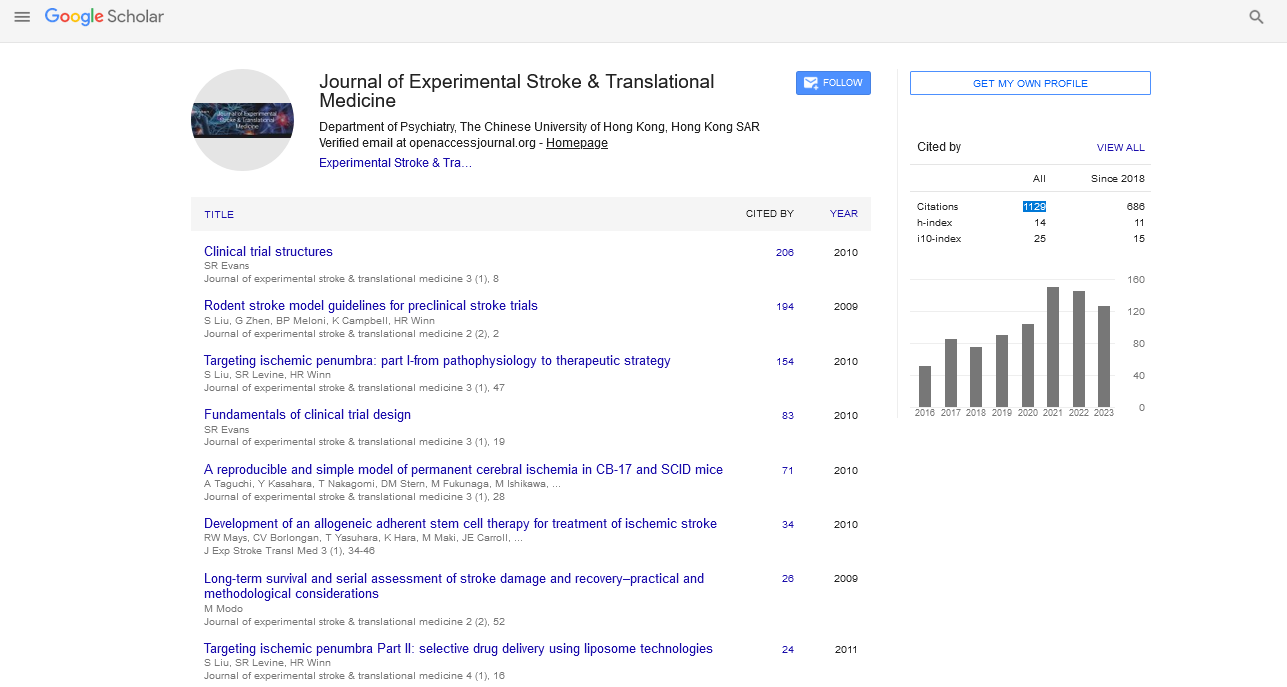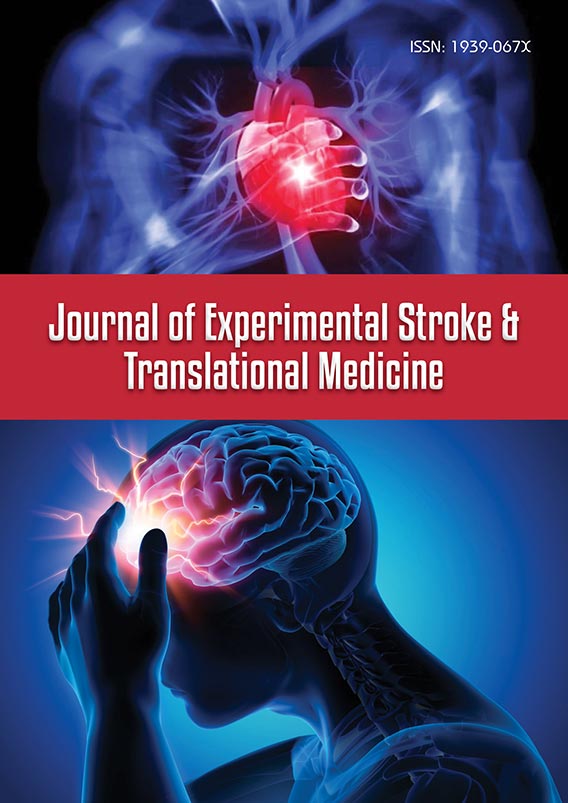Perspective - Journal of Experimental Stroke & Translational Medicine (2023) Volume 15, Issue 5
The Transformative Power of Translational Medicine
- Corresponding Author:
- Karine Andrieux
Department of Biochemisty,
Esabella Nantas University,
Cannes,
France
E-mail: karine.andrieu@parisdescartes.fr
Received: 18-Sep-2023, Manuscript No. jestm-23-118770; Editor assigned: 21-Sep-2023, PreQC No. jestm-23-118770(PQ); Reviewed: 05-Oct-2023, QC No. jestm-23-118770; Revised: 20-Oct-2023, Manuscript No. jestm-23-118770 (R); Published: 30-Oct-2023, DOI: 10.37532/jestm.2023.15(5).110-112
Introduction
Translational medicine stands as the critical intersection between scientific research and clinical application, promising to revolutionize healthcare by turning discoveries made in the laboratory into practical, patient-centered solutions. This exploration dives into the profound significance of translational medicine, its role in healthcare transformation and its potential to shape the future of medical research and patient care.
Description
Understanding translational medicine
Translational medicine, often referred to as bench-to-bedside research, refers to the process of translating scientific discoveries from basic research into clinical applications. It encompasses a continuum of research phases that take knowledge generated at the “bench” (the laboratory) and translate it to the “bedside” (clinical practice) to enhance patient care. This process includes the following phases:
T1-Bench to bedside: This initial phase involves translating basic research findings into potential clinical applications. Researchers seek to identify intervention targets based on their understanding of disease mechanisms.
T2-Clinical implementation: In this phase, the research transitions from the lab to clinical testing. Clinical trials are conducted to evaluate the safety and efficacy of interventions developed in T1, typically involving a small group of patients.
T3-Clinical practice guidelines: Once an intervention shows promise in clinical trials, T3 researchers work to develop evidence-based clinical guidelines. These guidelines ensure that the treatment is consistently and effectively applied in clinical practice.
T4-Population health impact: The final phase assesses the broader impact of an intervention on public health. Researchers evaluate how the treatment influences public health outcomes and may influence healthcare policy decisions.
The significance of translational medicine
Translational medicine carries immense significance in modern healthcare, ushering in transformative changes that extend beyond patient care:
Acceleration of medical discoveries: Translational medicine expedites the translation of laboratory discoveries into clinical applications. This acceleration ensures that promising treatments reach patients faster, potentially saving lives and improving healthcare outcomes.
Precision medicine: Translational medicine has laid the foundation for the development of personalized or precision medicine. By understanding the genetic and molecular underpinnings of diseases, treatments can be customized for individual patients, leading to improved outcomes and reduced adverse effects.
Reduction in drug development costs: Early identification of promising drug candidates within the translational process helps reduce costs and expedite drug development. This serves as a significant benefit for pharmaceutical companies and ultimately, patients.
Enhanced patient outcomes: Translational medicine ensures that clinical practices are grounded in the latest scientific evidence. This leads to better treatment options and improved patient outcomes.
Bridging the gap: Translational medicine aligns the efforts of researchers, clinicians and industry professionals, creating a united approach to healthcare advancements. It bridges the gap between theoretical discoveries and practical, patient-centered solutions.
Challenges in translational medicine
Despite its numerous benefits, translational medicine is not without its challenges:
Interdisciplinary collaboration: Effective translational research necessitates seamless collaboration between diverse professionals, including basic scientists, clinicians, pharmacologists, bioinformaticians and regulatory experts. bridging these gaps can be challenging.
Funding and resources: The multidisciplinary nature of translational research requires substantial funding and resources. Securing consistent financial support is crucial for sustaining translational research efforts.
Regulatory hurdles: Navigating complex regulatory pathways, particularly during the clinical testing phase, can be time-consuming and costly. Striking a balance between safety and speed poses a considerable challenge.
Data integration: Managing and integrating vast amounts of data from various sources, including genomics, proteomics and clinical records, can be complex. Developing effective data-sharing platforms and ensuring data integrity are essential.
Ethical concerns: Balancing the need for research progress with ethical considerations, such as patient privacy and consent, is an ongoing challenge in translational medicine.
Case studies in translational medicine
Cancer immunotherapy: The development of immunotherapies, such as immune checkpoint inhibitors, exemplifies the success of translational medicine. Basic research into the immune system’s role in cancer led to the development of groundbreaking treatments like pembrolizumab and nivolumab. These drugs have revolutionized cancer treatment and improved patient outcomes.
Stem cell therapy: Translational research in stem cell biology has led to promising regenerative medicine applications. For instance, stem cell-based therapies for conditions like spinal cord injuries and heart disease are moving from the laboratory to clinical trials.
Pharmacogenomics: Translational medicine has made significant progress in the field of pharmacogenomics, where genetic information is used to personalize drug treatments. This approach has led to more effective and safer medication management for various conditions, including depression, cancer and cardiovascular diseases.
Rare disease research: Translational medicine has been instrumental in advancing research and treatments for rare diseases. By bringing together researchers, clinicians and patients, it accelerates the development of orphan drugs and therapies for rare conditions that might otherwise be neglected.
The future of translational medicine
Translational medicine is poised to play an even more crucial role in healthcare and medical research in the future. Several key developments can be anticipated:
Artificial intelligence and big data: Advances in artificial intelligence and data analysis will help researchers make sense of the vast amount of information generated in translational studies. This will enhance our understanding of disease mechanisms and enable more personalized treatments.
Gene editing and CRISPR: Gene editing technologies like CRISPR-Cas9 have the potential to revolutionize the treatment of genetic diseases. Translational research will be critical in bringing these therapies from the lab to the clinic.
Virtual clinical trials: The integration of digital health tools and telemedicine will make it easier to conduct clinical trials, increasing accessibility and reducing patient burden.
Patient-centered research: Involving patients in the research process is becoming more common in translational medicine. Patient perspectives and insights are invaluable in shaping research priorities and treatment development.
Conclusion
Translational medicine is the critical link between scientific discovery and clinical practice, transforming the landscape of healthcare and medical research. While challenges exist, the potential for innovative treatments and improved patient care remains promising. With emerging technologies, patient-centered approaches, and a growing emphasis on data-driven solutions, translational medicine is well-positioned to continue shaping the future of medicine and offering hope for innovative therapies and better patient outcomes. As the field continues to evolve, it holds the promise of a brighter and healthier future for us all.

